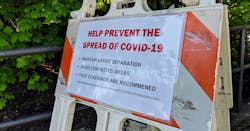Most employers intend to take a slow, phased-in approach to reopening their businesses and workplaces in the wake of the Coronavirus pandemic, according to a survey conducted by the global commercial real estate giant CBRE.
“Our analysis of our clients’ return-to-work strategies shows that virtually all are engaged in detailed planning to ensure a careful and reasoned approach,” said Karen Ellzey, executive managing director of consulting and global lead for CBRE’s COVID-19 response for occupier clients.
“Most of these companies have established their own criteria for when to return to the workplace beyond local and state government requirements. And nearly three quarters plan to bring employees back in phases rather than all at once.”
CBRE said about half of the 203 company operations that CBRE studied across the globe are implementing touchless technology to enhance cleanliness. Most are following social distancing standards. Most are providing their employees with face coverings, although fewer than a third say they will require the covering be worn at all times in any company facility unless mandated by local authorities.
CBRE gathered its findings by surveying account leaders in its Global Workplace Solutions business, which manages facilities and real estate projects for large companies. The surveyed account leaders oversee client relationships spanning 4.2 billion square feet of workspace in offices, industrial & logistics (I&L) real estate, tech space, data centers, retail, and healthcare used by more than 38 million workers. The analysis includes data collected as of May 4.
Among the major findings in regard to the most common steps taken to continue containment of spread of the virus are:
Social Distancing: At least 45% of the companies surveyed said they intend to follow guidance from local governments and health agencies on social distancing in the workplace. Another 34% have set their own global standard that may exceed local guidance, most typically requiring at least six feet or two meters of separation.
Face Coverings: About 59% of companies will provide face coverings for their employees, while 28% say they plan to require face coverings at all times at any company property. A larger portion—42%—will require masks only at company facilities where mandated by local government or health agency guidelines.
Visitors: Only 21% of companies will allow visitors to the workplace in the early phases of reopening.
Health Screening: Of the firms surveyed, 45% will require off-site self-screening for COVID-19 symptoms by employees before they arrive at the workplace, while 13% will conduct screening of employees on-site at every facility. Of those allowing visitors, 35% will screen visitors on-site.
Reopening Timeline: Only 20% of companies intend to reopen as soon as government restrictions are lifted. A larger portion—42%—will do so after their internal standards are met.
Reopening Approach: CBRE found that 72% of companies will conduct a phased reopening with defined percentages or groups of employees admitted over weeks or months. Meanwhile, 52% expect to give employees the option to work from home for the foreseeable future, although this will vary widely by industry sector and type of operation.
Space Preparation: Among the most common steps companies have taken to prepare their workplaces are installing signage (82%), establishing space-use policies and guidelines for social distancing (78%), outlining social distancing zones with floor decals and other reminders (74%), and reconfiguring furniture layouts (61%).
“With so many essential workers already performing their jobs at commercial properties, there is much that the industry is learning and adopting,” Ellzey pointed out.
“At the same time, companies must continually monitor local health conditions as they undertake further reopening efforts. Across the board, we see evidence that companies are taking a thoughtful, measured approach to reopening their work environments in a safe and methodical manner.”
About the Author

David Sparkman
David Sparkman is founding editor of ACWI Advance, the newsletter of the American Chain of Warehouses Inc. He also heads David Sparkman Consulting, a Washington, D.C. area public relations and communications firm. Prior to these he was director of industry relations for the International Warehouse Logistics Association. Sparkman has also been a freelance writer, specializing in logistics and freight transportation. He has served as vice president of communications for the American Moving and Storage Association, director of communications for the National Private Truck Council, and for two decades with American Trucking Associations on its weekly newspaper, Transport Topics.
